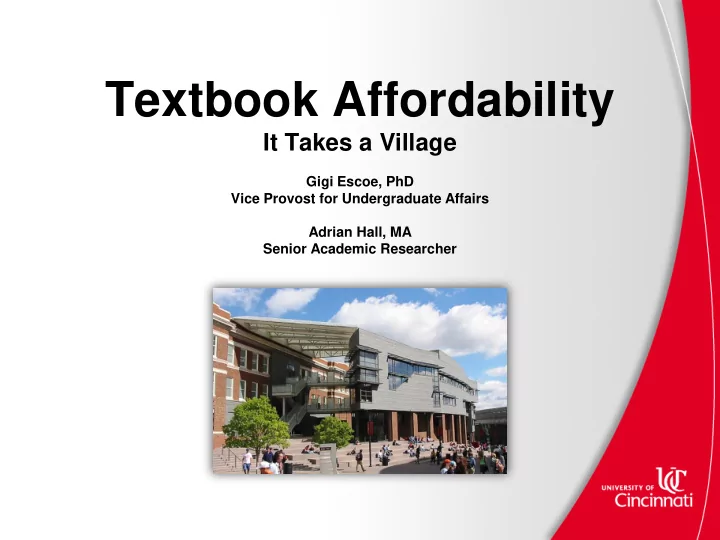

Textbook Affordability It Takes a Village Gigi Escoe, PhD Vice Provost for Undergraduate Affairs Adrian Hall, MA Senior Academic Researcher
Partners The Textbook Affordability Committee explores cost-saving strategies, and makes them more easily accessible to our faculty. We raise awareness and make introductions/connections to facilitate action. ► Provost Office ► UC Bookstore (Follett) ► IT@UC (Information Technology) ► Student Government ► The Faculty (Senate, and at large) ► Division for Administration and Finance ► CET&L (Center for Enhancement of Teaching & Learning)
Common Strategies ► Rent-A-Text $1,260,000 savings at UC (2014/15 estimate) ► Open Educational Resources / E-Books ► Custom Packaging Especially in common first-year programming ► Timely Textbook Adoptions Mass communications and protocol
Focus on High Enrollment Courses ► Top 20 Course Titles account for 17% of enrollment. ► Top 1% (42 Course Titles) account for 25% of enrollment. ► Many high enrollment courses require expensive books/materials (STEM, Foreign Language, Intro Social Sciences, Accounting, Art History).
UC’s Unique Strategy The Division for Administration and Finance now negotiates directly with publishers on behalf of our 44,000 students! ► Price/Quantity ► Delivery Mechanism (includED, print copies, iBook, etc.) ► Duration of student access to materials (E-Bookshelves, Multi-semester access, Repeated courses ► Capturing Digital Footprints (for data analytics) ► Student Intellectual Property
Of special interest: Course Fees ► Course text and ancillaries made digitally available to the entire class on Day 1 through a common course fee. ► Delivered through our learning management system, BlackBoard. UC Bookstore, operated by Follett, uses “includED”. ► Student Government has endorsed this usage of fees. ► Savings amounts can be calculated with specificity. Institutions can see the results and speak to them with real numbers.
Course Special Fees: Savings Course Normal Cost Leveraged Fee Anatomy & Physiology $373 for year $63 per semester Year Sequence $47 optional print copy for year General Chemistry $175 for year $63 per semester Year Sequence $23 optional print copy for year Applied Calculus $182 for year $57 per semester Year Sequence $27 optional print copy Intro to Psychology $119 for semester $73 for semester ► 2015/16 Total Savings Projected to exceed $400,000
Course Special Fees: Advantages ► Average savings around 40% ► All enrolled students have access from day 1 ► Stimulates conversations among faculty about textbook selection, pedagogy, and costs ► Fees post with tuition bill. Financial aid applies automatically. ► Customizable to specific student needs (print copies, DL considerations, book scholarships) ► Workbook access centrally supported through IT@UC ► Publisher relations supported through Bookstore
Special Fees: Disadvantages / Costs ► Introduces new expense and work for university staff (IT, Bursar, Registrar, Administration & Finance) ► Student concerns over fees (communication is key) ► Impact on private bookstores
Cost Benefit Analysis Increased volume of sales offsets loss of revenue from decrease in per unit cost. Course fees pay off when: ► Course has high enrollment ► Courses are those with electronically consumable materials, such as graded workbooks. These materials cannot be reused or leased. Used/rental copies are not an option. ► Students’ access to course materials is uneven historically (some students do not purchase materials). Materials delivered through a special fee should be only those required and essential to student success.
Conclusions / Questions
Recommend
More recommend